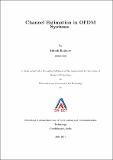| dc.contributor.advisor | Joshi, Manjunath V. | |
| dc.contributor.author | Rathore, Hitesh | |
| dc.date.accessioned | 2017-06-10T14:38:15Z | |
| dc.date.available | 2017-06-10T14:38:15Z | |
| dc.date.issued | 2010 | |
| dc.identifier.citation | Rathore, Hitesh (2010). Channel estimation in OFDM systems. Dhirubhai Ambani Institute of Information and Communication Technology, ix, 55p. (Acc.No: T00246) | |
| dc.identifier.uri | http://drsr.daiict.ac.in/handle/123456789/283 | |
| dc.description.abstract | Orthogonal frequency division multiplexing (OFDM) is not a new concept, but its receiver design has constant improvement. OFDM uses available spectrum efficiently and the system provides high data rates. Many standards such as Digital video broadcasting (DVB), Wireless local area network (WLAN), 3GGP LTE uses OFDM as standard. Most of the digital communication systems nowadays are wireless, where information bits are transmitted over a radio channel. These radio channels are generally multi path channel which cause inter symbol interference (ISI). To remove the effect of ISI from received signal equalization is done, which requires the channel impulse response. A good channel estimation technique can reduce the complexity of equalizer by large factor. Channel estimation can be done by sending pilot symbols at regular interval and at the receiver the channel impulse response is estimated using these received pilot symbols.
<p/>In this thesis various pilot based channel estimators are studied. We propose a new channel estimator, which is based on regularized least squares method and uses some prior information of the channel. The performance of existing channel estimators and proposed channel estimator is compared. The criteria for performance are on the basis of mean squared error (MSE) and symbol error rate (SER). Various adaptive channel estimators are also studied. We also propose a new adaptive channel estimator, based on two-dimensional normalized least mean squared (NLMS) algorithm with variable step size. The performance of existing adaptive channel estimators is compared with the proposed adaptive channel estimator. Performance comparison is based on MSE and the bit error rate (BER). | |
| dc.publisher | Dhirubhai Ambani Institute of Information and Communication Technology | |
| dc.subject | Orthogonal frequency division multiplexing | |
| dc.subject | Wireless communication systems | |
| dc.subject | Wavelength division multiplexing | |
| dc.subject | Orthogonalization methods | |
| dc.classification.ddc | 621.38216 RAT | |
| dc.title | Channel estimation in OFDM systems | |
| dc.type | Dissertation | |
| dc.degree | M. Tech | |
| dc.student.id | 200811006 | |
| dc.accession.number | T00246 | |

